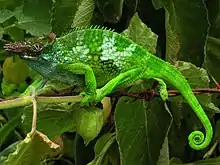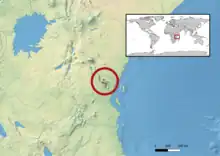West Usambara two-horned chameleon
The West Usambara two-horned chameleon or West Usambara blade-horned chameleon (Kinyongia multituberculata) is a chameleon endemic to the West Usambara Mountains of Tanzania.[1][2] Until 2008, it was generally confused with Fischer's chameleon (K. fischeri), which is not found in the Usambara Mountains.[3] None of its close relatives occur in the same range as K. multituberculata, but K. matschiei and K. vosseleri are restricted to the East Usambaras.[3]
| West Usambara two-horned chameleon | |
|---|---|
 | |
| male | |
| Scientific classification | |
| Domain: | Eukaryota |
| Kingdom: | Animalia |
| Phylum: | Chordata |
| Class: | Reptilia |
| Order: | Squamata |
| Suborder: | Iguania |
| Family: | Chamaeleonidae |
| Genus: | Kinyongia |
| Species: | K. multituberculata |
| Binomial name | |
| Kinyongia multituberculata (Nieden, 1913) | |
 | |
| Synonyms | |
|
Chamaeleon fischeri multituberculatus Nieden, 1913 | |
Habitat and conservation
This species inhabits Afrotemperate forests of the West Usambara Mountains at elevations of 1,200–2,500 m (3,900–8,200 ft) above sea level. It can also occur in modified vegetation adjacent to forest patches and on shrubs and trees by roadsides. However, it requires structurally complex habitats and does not range across transformed landscapes.[1]
The forest patches suffer from timber removal and resource utilization, and habitat is being lost to encroachment and transformation for agriculture. The habitat is highly fragmented, and better protection of forest reserves is needed. This species is estimated to be one of the most heavily exported chameleons from East Africa for international pet trade.[1]
See also
- Trioceros deremensis, the Usambara three-horned chameleon
Gallery
References
- Tolley, K.; Menegon, M.; Plumptre, A. (2014). "Kinyongia multituberculata". IUCN Red List of Threatened Species. 2014: e.T172574A1345983. doi:10.2305/IUCN.UK.2014-3.RLTS.T172574A1345983.en. Retrieved 20 November 2021.
- Kinyongia multituberculata at the Reptarium.cz Reptile Database. Accessed 28 June 2014.
- Mariaux, J.; Lutzmann, N.; Stipala, J. (2008). "The two-horned chamaeleons of East Africa". Zoological Journal of the Linnean Society. 152 (2): 367–391. doi:10.1111/j.1096-3642.2007.00332.x.

